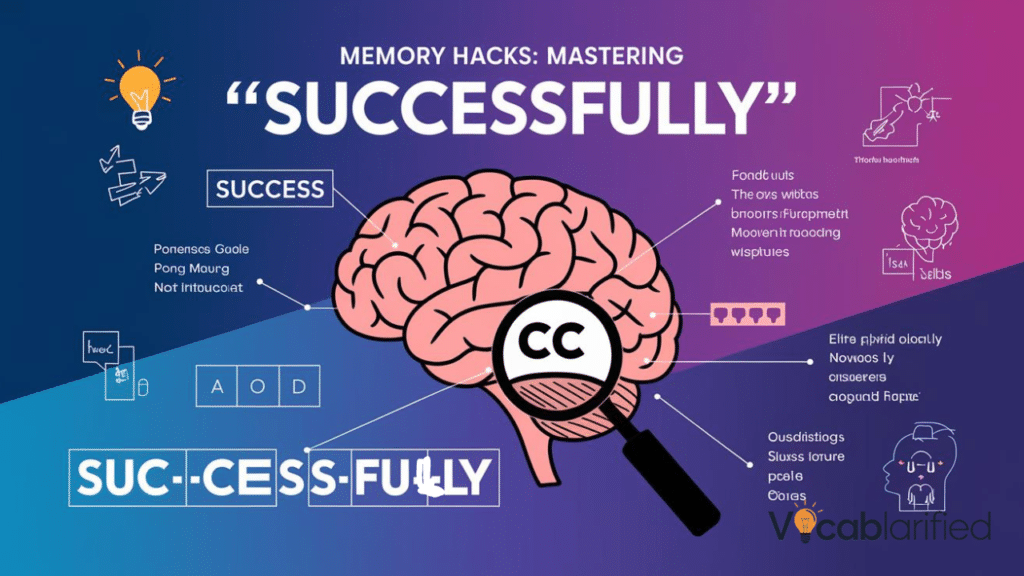In the vast realm of English orthography, few words spark as much confusion as “successfully” and its misspelled counterpart “succesfully.”
This article delves into the intricacies of this common spelling conundrum, exploring the correct usage and the reasons behind the frequent mistake.
The Correct Spelling
Let’s cut to the chase:
“Successfully” is the correct spelling. This adverb, derived from the adjective “successful,” follows the standard English rule of adding “-ly” to form an adverb from an adjective ending in “-ful.”
Why the Confusion?
The confusion often stems from the pronunciation of the word. In spoken English, the second “c” in “successfully” is often barely audible, leading many to mistakenly omit it when writing. This subtle phonetic nuance can trip up even native speakers, making it a common spelling pitfall.

Impact of Correct Spelling
Spelling “successfully” correctly is crucial in various contexts, from academic papers to professional emails. A misspelling can undermine the credibility of your writing and potentially lead to misunderstandings.
You Might Also Like This: Using Or Useing: Common Spelling Mistake Explained
Common Usage Scenarios
Let’s explore some scenarios where the term “successfully” might be used:
| Scenario | Example Sentence | Correct Usage |
|---|---|---|
| Job Application | I successfully completed the project ahead of schedule. | ✓ |
| Academic Paper | The experiment was successfully replicated in three different labs. | ✓ |
| Business Email | We successfully negotiated a new contract with our suppliers. | ✓ |
| Sports Commentary | The team successfully defended their championship title. | ✓ |
| Medical Report | The patient successfully recovered from the surgery. | ✓ |
| Legal Document | The defendant successfully appealed the court’s decision. | ✓ |
| Tech Support | The software update was successfully installed on all devices. | ✓ |
| Customer Service | We successfully resolved 95% of customer complaints within 24 hours. | ✓ |
| Marketing Campaign | Our new product launch was successfully received by the target audience. | ✓ |
| Personal Achievement | I successfully ran my first marathon last weekend. | ✓ |

The Adverb Form
“Successfully” functions as an adverb, modifying verbs, adjectives, or other adverbs. It describes how an action is performed or a state is achieved. Understanding its role as an adverb can help reinforce the correct spelling in your mind.
Adjectival vs Adverbial Usage
While “successful” is the adjectival form, “successfully” is the adverbial form. This distinction is crucial for correct usage in sentences. Let’s examine some examples to illustrate the difference:
| Adjectival Form (Successful) | Adverbial Form (Successfully) |
|---|---|
| She is a successful entrepreneur. | She successfully launched her startup. |
| The project was successful. | We successfully completed the project. |
| He’s known for his successful novels. | He successfully published his latest book. |
| They had a successful meeting. | They successfully negotiated the terms. |
| It was a successful experiment. | The scientists successfully conducted the experiment. |
| The successful team celebrated. | The team successfully defended their title. |
| He’s a successful lawyer. | He successfully argued the case in court. |
| The successful product sold out quickly. | We successfully marketed the new product. |
| She gave a successful presentation. | She successfully presented her findings. |
| It was a successful fundraising event. | We successfully raised funds for the charity. |
Common Mistakes and How to Avoid Them
One of the most frequent spelling mistakes is omitting the second “c” in “successfully.” This error often occurs because the double “c” isn’t clearly pronounced in speech. To avoid this mistake, remember that “success” is the root word, and it contains two “c”s.
The Importance of Correct Spelling
In today’s digital age, where written communication is prevalent, correct spelling is more important than ever. A simple spelling error can affect how others perceive your intelligence, attention to detail, and professionalism.
You Might Also Like This: Priviledge Or Privilege: What Is The Correct Spelling?
Spelling in Different Contexts
The correct spelling of “successfully” remains consistent across various English-speaking countries. Unlike some words that have different spellings in American and British English, “successfully” is spelled the same way globally.
Tips for Remembering the Correct Spelling
To help cement the correct spelling in your mind, try these memory aids:
| Memory Aid | Description |
|---|---|
| Root Word Focus | Remember that “success” is the root word |
| Double Consonant Rule | Note that “success” has a double “c” |
| Syllable Breakdown | Break it down: suc-cess-ful-ly |
| Pronunciation Practice | Emphasize the second “c” when saying it |
| Visual Memory | Picture two “c”s standing for “complete correctness” |
| Association Technique | Link it with other words ending in “-fully” |
| Write it Out | Practice writing the word correctly multiple times |
| Use in Sentences | Incorporate it into your writing regularly |
| Spell Check | Use spell-check tools, but don’t rely on them entirely |
| Mnemonic Device | “Successfully has two c’s to completely conquer” |

The Evolution of Spelling
The English language has evolved over centuries, and with it, so has spelling. The standardization of English spelling is a relatively recent phenomenon, largely influenced by the advent of printing and widespread literacy.
Spelling in the Digital Age
In our technology-driven world, correct spelling remains crucial. While spell-check tools are helpful, they’re not infallible. Relying too heavily on these tools can lead to complacency and reduced spelling skills.
You Might Also Like This: Onsite Or On-Site: Understanding The Key Differences
The Role of Context
Context plays a significant role in understanding and using “successfully” correctly. Let’s look at some examples in different contexts:
| Context | Example Sentence |
|---|---|
| Business | Our team successfully closed the deal with the international client. |
| Education | The student successfully defended her thesis before the committee. |
| Technology | The new software update was successfully installed on all devices. |
| Healthcare | The patient successfully recovered from the complex surgery. |
| Sports | The underdog team successfully upset the reigning champions. |
| Politics | The candidate successfully campaigned in key swing states. |
| Arts | The artist successfully blended traditional and modern techniques. |
| Science | Researchers successfully isolated the new compound. |
| Personal | I successfully quit smoking after years of attempts. |
| Social | We successfully organized a surprise party for our friend. |

The Psychology of Spelling
Interestingly, the ability to spell correctly is not necessarily linked to overall intelligence. Some highly intelligent individuals struggle with spelling, while others excel at it. This phenomenon highlights the complexity of language processing in the human brain.
Spelling and Professional Success
In many professional settings, correct spelling can be a marker of attention to detail and competence. A resume or cover letter with spelling errors, including misspelling “successfully,” might be quickly discarded by potential employers.
Teaching Correct Spelling
Educators play a crucial role in instilling correct spelling habits. Teaching strategies often include phonics, word patterns, and memorization techniques. For words like “successfully,” understanding its components (success + ful + ly) can be particularly helpful.
The Future of Spelling
As language continues to evolve, particularly in the digital age, some argue that strict adherence to traditional spelling rules may become less important. However, for now, correct spelling remains a valuable skill in both personal and professional contexts.
Conclusion
Mastering the correct spelling of “successfully” is more than just a matter of orthography. It’s about effective communication, attention to detail, and presenting oneself professionally. By understanding the word’s structure, practicing its usage, and being mindful of common pitfalls, you can successfully incorporate this term into your written repertoire with confidence and accuracy.
Remember, language is a tool for expression and connection. Using it correctly, including spelling words like “successfully” properly, enhances your ability to communicate effectively and achieve your goals, whether in academic, professional, or personal spheres. So, go forth and spell successfully!

Emma Carter is an experienced blogger at Vocablarified. She enjoys helping people expand their vocabulary and improve their language skills. With a warm and approachable writing style, Emma makes learning new words fun and accessible. When she’s not writing, she loves reading books and discovering new phrases to share with her readers. Emma is passionate about making language learning an enjoyable journey for everyone.







